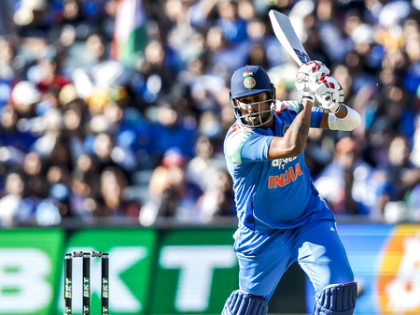Trained bowlers so they step up to bat, says Harshit Rana’s childhood coach Shravan Kumar
By IANS | Updated: October 23, 2025 21:20 IST2025-10-23T21:17:05+5:302025-10-23T21:20:14+5:30
New Delhi, Oct 23 Harshit Rana’s childhood coach, Shravan Kumar, spoke about the pacer’s performance in the second ...

Trained bowlers so they step up to bat, says Harshit Rana’s childhood coach Shravan Kumar
New Delhi, Oct 23 Harshit Rana’s childhood coach, Shravan Kumar, spoke about the pacer’s performance in the second ODI between India and Australia, which concluded on Thursday at the Adelaide Oval. He also shared his opinion on Virat Kohli’s successive ducks and the team’s overall performance.
After some notable knocks by Rohit Sharma, Shreyas Iyer and Axar Patel helped India reach a good total, Rana played a crucial cameo and increased the score slightly with an unbeaten 18-ball 24.
His knock was studded with three boundaries as the 23-year-old played flawless shots and batted confidently. He also took a couple of wickets in the second innings as India aimed to restrict Australia during their chase, but his efforts went in vain as the Men in Blue lost the match by two wickets.
Shravan Kumar, speaking exclusively to IANS, praised Rana for rising to the occasion when India needed him most and noted how he has consistently trained bowlers, including Ishant Sharma, in a way that prepares them to contribute runs with the bat down the order whenever required.
“I saw him play today. He batted really well. I've always trained bowlers so they can step up to bat. That's always a plus point. Ishant Sharma has also contributed well with the bat at No. 11 on several occasions, whenever needed, and has supported his partner on the other end as per the need of the hour. Such partnerships, in the end, are always essential. Everyone should get an opportunity to play,” Kumar said.
India’s veteran batter Virat Kohli registered his second consecutive duck in the series, marking the first instance of him walking back for 0 in Adelaide. Kumar stated that lack of game time, and the non-willingness to keep practicing will affect a players’ performance.
“Concentration plays a part in the matches. There are the age and sincerity factors too. This is him going out of touch. And then players play selective games, which will directly affect their performance and the team's results. A player must be ready for all games. If he's not prepared, it means he's not practising either. One should be ready to play all sorts of games, whether Tests, ODIs, or T20Is.
“But for those who play just one format, there's a casual approach that kicks in. IPL is all about money and fun. In the current scenario, players are selected based on their IPL performances. And if they don't perform in international cricket, then they're criticised. If you're choosing a player based on his IPL performance, then make him play just T20Is, not other formats,” he noted.
Although the Indian batters did well in the second ODI, they fell a few runs short as Australia chased down the target with 22 balls remaining. The bowlers also failed to restrict the hosts, as a few dropped catches allowed the Aussies to win the game and, with that, the three-match series, with one game still to be played.
Kumar believes that the players failed to adapt to the Australian conditions and the lack of preparation led to their loss down under. He pointed out the differences between the Indian and Australian wickets, noting how the bounce creates a distinguishing factor.
“We weren't able to adjust to the Australian conditions. We should've played 2-4 practice matches there to understand the conditions. The difference between Australian and Indian conditions is in the bounce. The bounce on Indian wickets is knee height, whereas theirs is till the waist, which we fail to match. In the Test match, you must have seen that the batters were dismissed poorly and we lost, but then we made a comeback. But in one-day cricket, there's no scope for a comeback,” he concluded.
Disclaimer: This post has been auto-published from an agency feed without any modifications to the text and has not been reviewed by an editor
Open in app